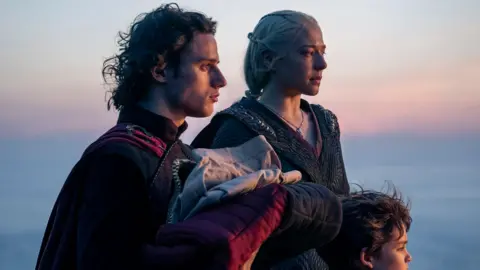 HBO
HBOAhead of the second series of House of the Dragon, a prequel to Game of Thrones, its stars have been speaking to the BBC about what to expect.
Based on George RR Martin’s epic fantasy novel A Song of Ice and Fire, House of the Dragon stars a collection of British talent, including Matt Smith, Emma D’Arcy and Olivia Cooke.
The second season of the HBO prequel picks up just days after the final events of the first season.
While there is promise of more monumental battles and fiery dragon encounters, the new series presents a number of challenging situations, with the characters facing grief and revenge in the aftermath of earlier events.
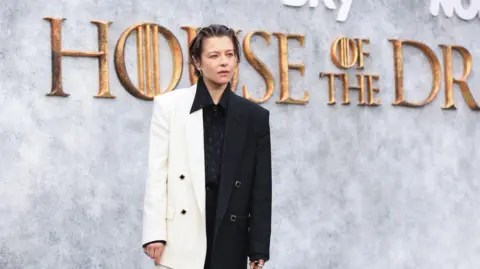 Getty
GettySeason two sees Westeros on the brink of a bloody civil war as the Green and Black Councils fight for King Aegon and Queen Rhaenyra respectively.
The climatic final events of season one have seen a number of changes to characters’ motives in this next instalment.
D’Arcy, who stars as Princess Rhaenyra Targaryen, told BBC News that portraying both a grieving mother and a powerful ruler presented many obstacles, but that they relished the opportunity.
“You have no option,” said D’Arcy. “You have to have great stamina. It’s a marathon.
“You come in with colour in your cheeks, and love and joy in your heart. But I love the epic nature of shooting six days a week, for 15 hour days, over six months.”
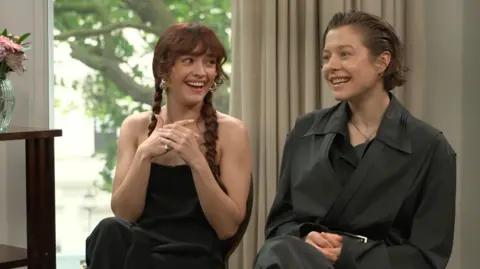
Cooke, who plays Queen Alicent Hightower, called the season “really challenging”.
“It’s coming to terms with grief and trauma, and how do you play those and sustain that for a seven-month shoot, playing all the complexities within that?” she said.
“She [Alicent] had all this power and then now becoming dowager queen. She’s trying to figure out within this backdrop of guilt and shame – who she is if she can’t rule from the shadows?”
In House of the Dragon, the franchise’s central struggle for power leads characters to do abhorrent things in order to claim the throne – something adored by the loyal fanbase.
Asked if they thought their characters were terrible people, or good people who have terrible things placed upon them, D’Arcy said: “I think they’re all people trying to sustain themselves in a pretty terrible system.
“That system can cause those characters to do pretty awful things.
“The thing that I adore about Game of Thrones is you have such a complex, exciting, varied constellation of characters, and you’re made to yearn to see those, to watch those collisions take place.”
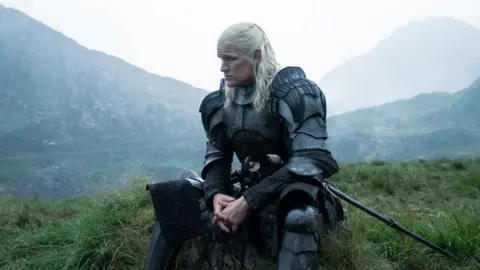 HBO
HBOTwo characters who fans will be eager to see back on screens are the mercurial Daemon Targaryen, played by Smith, and villainous Aemond Targaryen, portrayed by Ewan Mitchell.
Speaking on the waterlogged red carpet at a rainy UK premiere for season two, Smith said: “We are delving back into the fractious world of the Targaryens and there is a lot of grief flying around, and that makes people act strange, it makes people vulnerable, it makes people mad.”
‘Wild ride’
Smith’s Daemon will face a struggle for power while caring for his now shattered family.
“He is tipping over into a mythic place of discomfort. He’s in for a bit of a wild ride this year,” Smith said.
Asked how it felt playing a character so evil, Mitchell said it was “horrible”, explaining: “I don’t like playing evil.
“As a character, Aemond possesses this facade, a shield of armour that he has manufactured over a number of years to hide his insecurities.”
But he added: “As an actor it is so enjoyable playing a character like Aemond and really dive into his multi-faced complexities.”
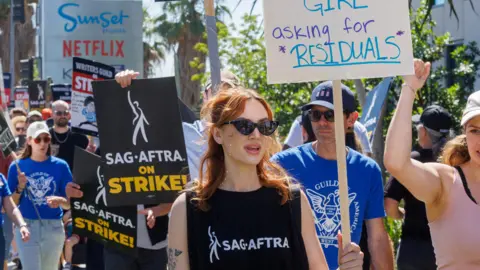 Reuters
ReutersHouse of the Dragon was one of the few US productions that continued to shoot during last year’s Hollywood writers’ and actors’ strikes.
For almost three months in 2023, industry writers and actors walked out in a dispute over fair pay and the use of artificial intelligence in the indsutry.
But the House of the Dragon cast did not take part because the show was mainly filmed in the UK under contracts overseen by British union Equity, rather than its striking US counterpart the Screen Actors Guild (SAG).
The show’s writer Ryan Condal told the BBC it was a “fraught period”, but a “great privilege” to keep the cast and crew employed.
“There was lots of labour strife,” he said. “We were lucky all of our scripts were done and we were already in production when when the writers’ strike happened.
“The thing I was happy about was keeping our crew of 2,500 people employed. It was a very fraught time, and a lot of people went through really tough times, so just the fact that our crew could keep working was a real privilege.”
Olivia Cooke said the strikes period was “strange”.
“It felt weird. It felt wonky,” she said.
“A bunch of us are members of SAG, but we were under a different union. We sort of had to continue to work, otherwise we’d all get sued.
“We didn’t feel good, but we were also aware that we were really lucky to be still shooting because a lot of cast and crew really relied on this job. It was really multifaceted and strange.”
Early reviews of season two so far have been strong.
Empire gave the season four stars, saying the series “remains a spiky, acidic human drama; an astute, timely and well-performed study of the way power and wisdom are so often mutually exclusive”.
The Telegraph also awarded it four stars, writing: “House of the Dragon has all you could require for a roaring good time.”
Movie review site Roger Ebert called the latest series “captivating”, but added that convoluted writing resulted in a slow start “for better, and sometimes for worse”.
House of the Dragon season two will be available in the US from 16 June, and in the UK from 17 June.





